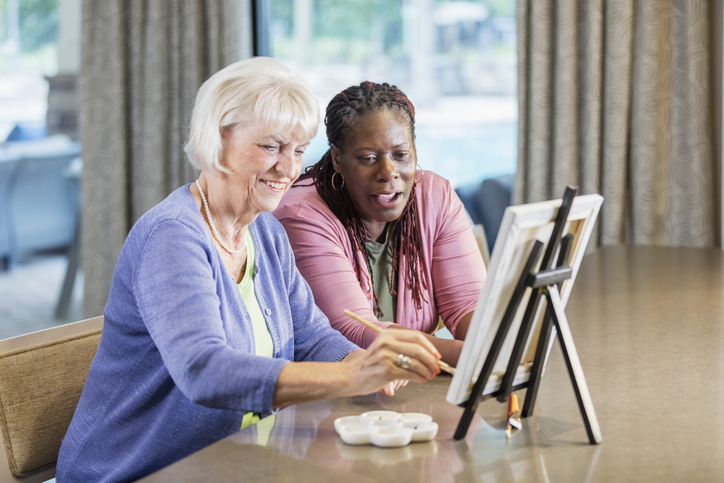
Use these dementia care activities to boost sensory stimulation and reduce feelings of anxiety.
Unexplained mood swings are hallmark symptoms of dementia, and can be challenging for family caregivers to navigate. One minute you are enjoying a nice activity together, when seemingly out of nowhere, the person’s countenance darkens. You may then find yourself walking on eggshells as you cautiously make an effort to resolve a situation you don’t fully grasp.
While it’s helpful to find out the main cause behind powerful emotions like fear, anxiety, and agitation, unfortunately, it’s not always feasible. There might be a known cause, like loud noises or fatigue, that can be easily resolved; but there may be more arbitrary factors, like the person remembering an distressful memory from many years ago that they are unable to speak about. Dementia care activities that stimulate the senses can help with these issues.
What Should I Do Now?
After determining that the older adults is not in pain or physical discomfort, there are two essential things to do:
- Journaling: Keep a notebook close by while caring for the senior. Record the date, time of day, and any other particulars with regards to an incident of agitation. For instance, note if the senior had just woken up, had just finished having dinner, hadn’t used the restroom for a few hours, was watching the news on television, etc. The time of day is particularly significant to note, as people with dementia often suffer from more anxiety in the late afternoon and evening. The goal of journaling is to look for commonalities and patterns to help you avoid future occurrences.
- Diversion/Redirection: After validating the feelings the older adult is having, it’s often effective to move into a different part of the home (or even to go outside if the weather is nice enough) and shift the focus to something pleasurable. If it’s been a while since breakfast, a mid-morning snack in the kitchen might help. If the senior is wandering or pacing, try going out for a walk around the block or even to the park. In some instances, listening to favorite music can provide a sense of relaxation. Try various techniques and document the outcomes in your journal for future reference.
Engaging the Senses
Sensory exercises can help preempt or create distraction from challenging mood swings. Try making and implementing some of these creative ideas from our experts in home care in Belleville, IL and the surrounding areas:
- Scented Cards: Cut strips of cardboard and affix aromatic items in small zip-lock plastic baggies to one end. Use a number of scents that bring to mind memories or a feeling of peace: peppermint, coffee, suntan lotion, cinnamon, pine needles, chocolate, etc. Use your imagination and talk about each aroma while enjoying them together.
- Aquarium Bag: Fill a large zip-lock plastic bag with water beads and a variety of small plastic aquatic animals, plants, etc. Use this idea as a springboard to other sensory bags with different themes in line with the senior’s unique interests.
- Homemade Paint: Prepare a batch of this safe, nontoxic paint to keep around, which can be used for either finger painting or brush painting. Blend together ½ c cornstarch and 2¾ c cold water in a pan. Cook and stir over medium heat until boiling. Stir 1 envelope of unflavored gelatin into ½ c of cold water and add to the cornstarch and water. Let the mixture cool, and then divide into different containers, adding different colors of food coloring to each.
Want More Ideas?
Morning Glory Home Care’s experts in home care in Belleville, IL and the surrounding communities are full of imaginative ideas such as these, as well as the skill to help effectively take care of even the most challenging symptoms of the disease. Our objective is always to make life the best it can be for the seniors we serve, each and every day. Call us at 618-667-8400 to find out more.
